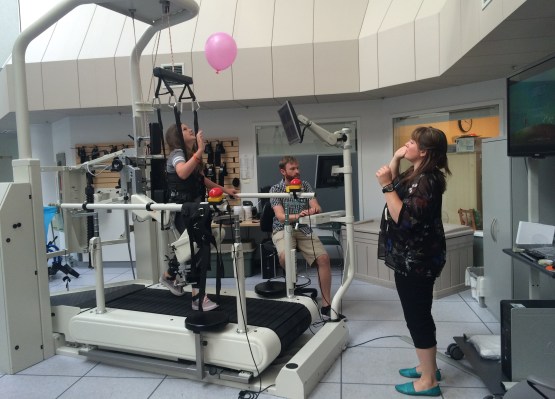Kids suffering from cerebral palsy may soon have a powerful new physical therapy technique in the form of robotic assistance for their legs. A study is being conducted on the potential benefits of the system, newly adapted for the use of children.
Lokomat is a “robotic gait training program” that’s been around for a couple of years, but mainly used by adults. As any doctor will surely tell you, treating kids is a whole different process — and not just because they’re smaller. Just like in school, motivation and attitude need to be considered more closely.
“Robotic gait training interventions are becoming more and more popular, especially for parents who are seeking out the newest technologies and interventions,” explained Shanon Phelan, who’s helping run the study at the University of Alberta. “We tend to assume all children want to walk or use a robot because it’s cool, but that’s not always the case and it’s important to listen to the child’s perspective on this.”
Today at the university, the researchers conducted a little photo op and press event to show off the device. 12-year-old Maggie Slessor, who suffers from a form of cerebral palsy, demonstrated the Lokomat with the help of her physical trainer.
In the press release announcing the study, Slessor is enthusiastic: “It’s great to be able to walk without having to hold on to anything. My friends think it’s really cool when I show them the pictures. They think I’m a robot!”
The legs support the user’s body weight while guiding them through the ordinary motions of walking; this reduces or eliminates the need for the person to hold onto something while they walk — potentially providing a big morale boost. That’s especially important with children.
“We are interested in how the treatment affects walking,” explains the study’s leader, UA’s Lesley Wiart, “but also how it affects the child’s confidence to participate in physical activities and their participation in other activities in their homes and communities.”
The study will be the largest randomized, controlled trial yet to evaluate the effectiveness of robotic gait assist, but the “qualitative” aspect of it is also new. Even if it were to only have a minimal effect on the physical side, it could still be a major success on the psychological front.
Work has just begun, and the study is expected to last five years and involve at least 140 kids. Good science takes time, after all.
